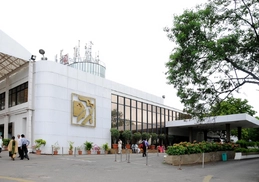
+91 8095511877

+91 8095511877
Bladder cancer occurs when the cells in your urinary bladder start multiplying uncontrollably. Men are three times more likely to have it than women. It usually occurs in those above the age of fifty-five.
The presence of blood in your urine is the most common symptom. Since signs start at an early stage, it is possible to detect bladder cancer quite early. It is easy to treat if it as at the initial stage.
Your treatment depends on the stage of cancer. If it is in an early stage, you will have a cystoscopic resection of the bladder tumor. If a large part of the bladder is affected, you will need radical surgery to remove it. If it is an advanced stage, you will need radical chemoradiotherapy or systemic therapy.
Even after treatment, your cancer can come back at a later time. So you need to have periodic tests to rule this out.
There are three main types of bladder cancer. These are
The five stages are:
The exact cause of bladder cancer is not clear. Genetic changes in the cells affect the way the cells in the bladder divide. But we do not know what causes these changes. However, we know about some factors that increase your risk of bladder cancer.
Some of the risk factors are
Symptoms appear in the early stages. Most of the symptoms appear while you pass urine. Some of the common ones are
Most of these symptoms are disturbing and will make you go to a doctor. If your doctor rules out other issues and suspects cancer, you will have a few tests to confirm it. Fortunately, this helps to detect the disease at a very early stage.
Some of the tests that your doctor may ask you to do are
Internal examination- Your doctor will insert a gloved finger to your rectum or vagina to feel for any hard lumps close to the bladder.
Urine analysis- Your urine sample will be subject to various tests to detect the presence of blood, pus cells, etc
Cystoscopy- The surgeon will insert a small flexible tube with a camera into your bladder to view it from inside.
Biopsy- It helps to confirm whether a tissue sample has cancer cells.
CT scans/ MRI- It helps to locate cancer as well as its extent precisely.
If the tests confirm cancer, you will have to start treatment at the earliest.
Surgery is the most common treatment for bladder cancer. There are many options for the surgery. Your doctor will choose the right method as per the state of your cancer. The main surgical options are
It is the standard option if you have early-stage cancer.
The surgeon will insert a tube with a camera at the tip through your urethra. It provides a clear view of the inside of your bladder. The surgeon will then cut and remove the cancerous part with the help of a wire loop.
It is a surgery to remove a part or whole of a urinary bladder having cancer.
During the surgery, your surgeon will also remove the nearby lymph nodes. In men, the surgeon will also remove the prostate gland and seminal vesicles, that lie close to the bladder. In women, the surgeon will remove the ovaries, fallopian tubes, the uterus (womb), cervix, and a small portion of the vagina as well.
You will have bladder reconstruction surgery after this.
The surgeon will make an artificial bladder using a part of the small intestine. There are three main types.
Incontinent diversion: In this, the surgeon creates an artificial channel for the urine to flow out of the body. The channel will connect the kidneys to an opening in the abdomen called a stoma. Over the stoma will be a urostomy bag to collect the urine. You need to empty the bag once it is full. The problem is that you will not have any control over the flow of urine.
Continent diversion: Here, instead of placing a bag outside the stoma, the surgeon will create a small pouch inside it. There will also be a valve that only opens inwards. Once the pouch is full, you can drain it outside using a tube. The advantages are the absence of a urostomy bag and that you will have control over urine flow to the outside.
Neobladder: Your surgeon will create an artificial urinary bladder from intestinal tissue. The surgeon will attach the ends of the bladder to the ureters and urethra. It helps in normal urination.
Here, the drugs are put directly into the bladder with the help of a catheter. This approach is useful only in early-stage cancer that only involves the lining. It does not reach the deeper layers of the bladder wall, the kidneys, ureters, or urethra. It is a very effective therapy to control local recurrence of superficial bladder cancer.
It uses medicines to destroy cancer cells. You will have medicines through your mouth or the veins. You may have it before surgery to shrink the tumor (neoadjuvant chemotherapy) or after surgery (Adjuvant Chemotherapy)to destroy the remaining cancer cells. In those with advanced-stage cancers, chemotherapy will help to get relief from the severe symptoms. In Muscle Invasive Bladder Cancer, chemotherapy increases survival and overall response.
It is a new form of managing bladder cancer when it is Muscle Invasive or Metastatic, and the patient is not fit for chemotherapy. Kidney dysfunction and poor general health are two main conditions that make a person unfit for chemotherapy. Immunotherapy aims to destroy the cancer cells by increasing the immunity of the body. Those having the treatment will receive medicines through the intravenous route.


This article has been reviewed for medical correctness and relevance by
Dr Niti Raizada
Dr. Niti Raizada is a senior Medical Oncologist with over fifteen years of experience in the field. Dr Niti has special interests in the areas of Thoracic, Gastrointestinal, Breast, Gynaecological Oncology, and Bone Marrow Transplants. She did her MBBS at Gandhi Medical College, Bhopal; MD-General Medicine at G R Medical College, Gwalior, DNB-General Medicine from National Board Of Examination,DM from Adyar Cancer Institute Chennai and Fellowship in Hematology from Hammersmith Hospital and Imperial College,London. She is a member of American Society of Clinical Oncology,USA; Royal College of Physicians,Edinburgh,UK; Member of Pharmacy Committee,Member of DNB teaching program in Medical Oncology and European Society of Medical Oncology (ESMO).

Aida Ismail
Australia

Apollo Chennai

Apollo Health City

Apollo Indraprastha

Aster CMI

Dharamshila Narayana

Fortis Bangalore
Frequently Asked Questions
Is bladder cancer curable?
How to prevent bladder cancer?
How to detect bladder cancer early?
Will bladder cancer come back after treatment?
What is the cost of bladder cancer treatment in India?